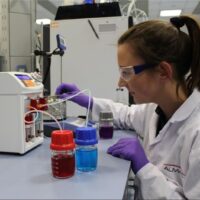Challenges in the Synthesis of Modified Histones
Event: Novabiochem Symposium 2013
Speakers: G. Cotton, G. Gray, A. Marques & K. Woznica – Almac
Histones are highly basic globular proteins, which form an octamer complex with other histones. The histone octamer acts as a spool for coiling genomic DNA and is involved in the growing field of epigenetics. Histones are subject to a wide variety of post-translational modifications, which occur predominantly on the unstructured Nterminal tail. These post translational modifications form an epigenetic code central in the regulation of regular and disease-specific cellular processes, in particular DNA replication, repair and transcription. Understanding how these patterns of histone modifications can regulate fundamental biological processes is a key challenge, which is increasingly being pursued by pharmaceutical companies. Therefore the provision of site specifically modified histones is crucial for fundamental research and drug discovery applications.
Production of modified histones by recombinant methods is not directly possible. Using our proprietary platform technologies for the chemical synthesis of proteins, we are able to provide full-length natural histones containing a wide variety of post-translational modifications at any specified site(s) within the protein.


